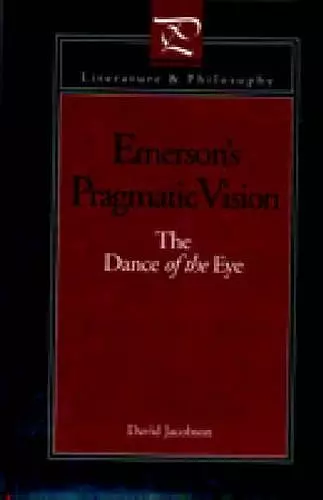Emerson's Pragmatic Vision
The Dance of the Eye
Format:Hardback
Publisher:Pennsylvania State University Press
Published:28th May '93
Currently unavailable, and unfortunately no date known when it will be back
This hardback is available in another edition too:
- Paperback£34.95(9780271026459)

The long ignored philosophical content of Emerson's writings has recently emerged as a central topic in Emerson studies. In Emerson's Pragmatic Vision, David Jacobson enters the discussion, placing Emerson in a line of philosophers from Kant and Hegel to Heidegger and Derrida, and adding to our understanding of his philosophical appropriations and anticipations. In the process Jacobson shows how Emerson grappled not only with basic issues of philosophy but eventually with the value of philosophical discourse itself. Conceiving Emerson's writings as reflective of a continuous inquiry into the fundamental question that motivates philosophy and guides reason—the question of Being—Jacobson traces his movement through philosophical humanism and anti-humanism to his identification of a philosophy founded on a reconceptualization of individual practice.
Emerson's Pragmatic Vision depicts not two Emersons but three. Between the early humanist confidence in self-reliance and the late embrace of fate, Jacobson identifies a transitional period, enunciated in the stark lecture, "The Method of Nature" (1841), and typified by the pessimism and humanist nostalgia of "Experience." The doctrine of fate, Emerson's mature pragmatic philosophy, is presented as a response to this period in which is found Emerson's retrieval of a philosophical posture rooted in obedience to the eloquence of the practice of life.
“Emerson’s Pragmatic Vision is an excellent and thorough piece of reflection and scholarship. Jacobson carefully traces the transformations of Emerson’s vision and relocates the early material within the larger evolution of a naturalist perspective. He shows how ‘The Method of Nature’ marks a turning point in which Emerson moves decisively beyond his earlier humanism (with its attendant narcissism) toward a view which places the human process at the service of the much vaster and more compelling method of nature.”
—Robert Corrington, Drew University
ISBN: 9780271008967
Dimensions: 229mm x 152mm x 14mm
Weight: 540g
220 pages